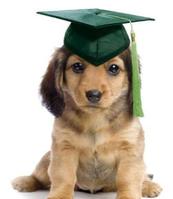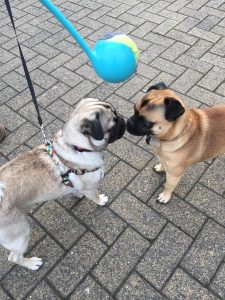How To Socialise Your Puppy The Right Way.
We’ve all heard how important socialisation is for young puppies. But, what exactly does puppy socialisation mean and how do you socialise your puppy the right way? Read our Holidays4Dogs article to find out.
It is important for puppies to learn how to interact with their environment, people, dogs and other animals in an appropriate manner. Pet dogs learn this, through the process of socialisation. However, puppy learning always needs to be positive and they need us to make sure their experiences as they grow, are good ones.
Dogs need help from us to navigate the human world and situations they will have to encounter during their lives. By being good dog owners, we can ensure our pets grow up to be well-balanced, happy, adults. Crucially, it also means they do not cause a nuisance to other members of the public, other dogs, or livestock.
Stages of puppy development.
 The crucial time for socialisation is between the age of three, and twelve, weeks. This is the period where the puppy will need to experience positive associations.
The crucial time for socialisation is between the age of three, and twelve, weeks. This is the period where the puppy will need to experience positive associations.
After 18 weeks, it becomes a little more difficult to socialise a puppy with little previous experience of the world around them. It is not impossible, but can be more challenging and take a little while longer.
While socialising a puppy, it is really important not to overwhelm him, or her. There should always be lots of praise and treats with the aim of making EVERY encounter a positive one.
Holidays4Dogs has compiled some suggestions of things puppies need to be exposed to in their early weeks.
Other people and other dogs. Always ensure other parties are happy to interact with your dog beforehand. Some people are scared, or just don’t like dogs. Other people prefer to enjoy public spaces without being mobbed by dogs – especially off lead ones.
Different animals – cats, small pets, livestock. (Approach, other animals, livestock etc with the puppy on the lead at all times).
People wearing different clothing such as hats, high viz. jackets, hoods, umbrellas.
Busy town environments, bus stops, railway stations – (especially if you plan on taking your dog with you on public transport).
Water – ponds, sea, rivers, rain.
Vehicles – both riding in and encountering on the road – to include cars, lorries, bicycles, buses and trains. Always with your dog on the lead.
Various different surfaces and terrain. I.e. laminate / hard wood flooring, gravel, cobbles, steps and stairs.
Objects such as bleeping pelican crossings, road signs, dustbins, gates, (especially kiss gates), household appliances.
Puppy socialisation – keep it short and sweet.
Always keep sessions short when socialising your puppy. Try not to overwhelm your pup with too many situations all at once. Begin in quieter areas and build up gradually, to places where there is more going on.
Retail parks, for example, are ideal places to socialise. Initially, choose a quiet day during the week. Spend about 10, or 15 minutes, wandering around and perhaps stand outside a shop for a few minutes. This way, your pup will have the opportunity to see strangers walking by.
Give your pup plenty of praise for being friendly and calm. It’s an idea to have plenty of treats handy, so strangers can offer one to your puppy.
Visiting pubs, or dog friendly cafes, are also a good way to get your pup used to being out and about in public spaces. Again, choose a quiet pub, or café, to begin with. You can also then use this space to begin teaching your dog to ‘settle’.
Parks can be good places to socialise your puppy with both dogs and people. However, be careful of boisterous, out of control dogs that might frighten the youngster. Make sure dogs are allowed off lead and don’t just let your dog run up to everyone they meet.
Always aim to set situations up so your dog has a positive experience. If, for example, your Yorkshire terrier pup is jumped all over by a boisterous off-lead Labrador, they may not view this as much of a positive experience and be wary of large dogs in the future.
Always try to think about the best places to go beforehand. Keep experiences low key and short.
Group training and socialisation classes.
These can be a great way for both puppies and new dog owners to learn new skills. However, beware of classes that are not supervised appropriately. Puppies should be of similar ages and sizes and classes should be well structured and managed well. A free-for-all group session that just involves lots of unfamiliar dogs, or differing ages running around, is unlikely to be helpful.
Conclusion.
Puppy socialisation is important, but it needn’t be complicated. The more your dog experiences positive interactions, the easier things will get. Before long, you will be able to take your confident pooch with you anywhere.
Whether you are socialising a new puppy, or an older rescue dog, remember variety is the spice of life. Always try to make sure new experiences are up-beat and positive.
Our Holidays4Dogs carers understand the need for dogs of all ages to lead stimulating and varied lives. This is just what they will get when they are on holiday with us!
For further information on booking a stay for your pooch – give us a call.


